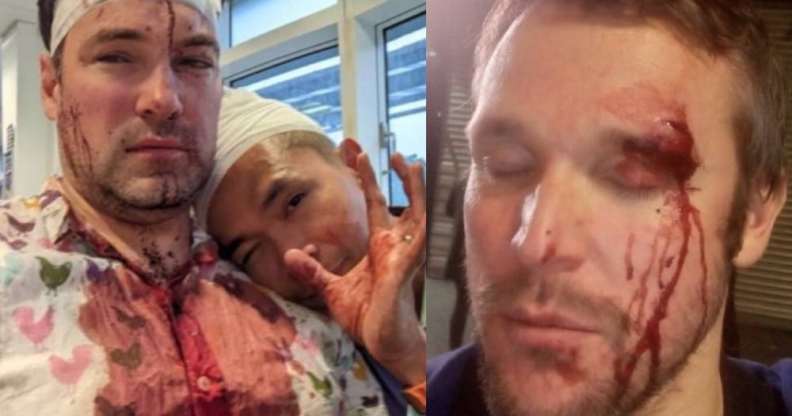Birmingham leaders announce major steps to combat spike of anti-LGBT+ violence

Victims of homophobic violence in Birmingham (Twitter/@jpkesseler)
Birmingham leaders have announced proposals to tackle the spate of homophobic attacks in and around the Gay Village.
A raft of new measures includes increased police patrols and a £200,000 funding injection to support victims of hate crime. The possibility of a 24 hour public transport service is also being examined.
The plans were announced by West Midlands mayor Andy Street, Birmingham Council leader Ian Ward and the West Midlands crime commissioner Simon Foster, who were prompted to take action following the latest attack on Sunday (10 October).
John-Paul Kesseler was left with blood pouring down his face after being beaten with a wine bottle and an iron bar, simply for holding another man’s hand in the street.
This latest attack followed reports of a gay couple being beaten with glass bottles and a victim of another suspected homophobic attack almost losing his sight, among others.
With Birmingham’s LGBT+ community feeling frightened and anxious in the wake of the assaults, the three leaders united in a joint statement condemning the violence.
“The recent abhorrent, vicious homophobic attacks in Birmingham disgust the three of us in equal measure,” they said.
“For someone to be assaulted because of who they are or who they love is simply not acceptable. But hate will not win and our message to the homophobes is that they do not represent Birmingham and they never will. Everyone has a right to feel safe on our streets, no matter where they are, day or night.”
West Midlands Police has already increased patrols in and around the Gay Village, they said, and the police and crime commissioner has commissioned a new £200,000 service to support victims of hate crime.
“Meanwhile, Birmingham City Council is providing free hate crime training to businesses at Southside venues as well as helping to develop a space open to anyone who may be feeling vulnerable when out and about in the Gay Village and the local area,” the statement continued.
“The West Midlands Combined Authority has been working with Southside Bid and other partners to look at issues such as CCTV and 24/7 public transport to improve night-time safety in the area.”
The city leaders concluded with a message of inclusivity, stating firmly: “We are a diverse city. We are an inclusive city. We are a city that says no to crimes like these.
“The message from us could not be clearer: We are proud of our region’s diversity. We are proud of our difference. We all feel an unwavering duty to stand together, to root out these crimes and bring the perpetrators to justice.”
Full statement from PCC @SimonFoster4PCC, @MayorWestMids and @BrumLeader following recent homophobic attacks in the #Birmingham Gay Village.
Hate and violence directed at LGBTQ+ people won’t be tolerated in the city or the region. pic.twitter.com/Jls7vcPtiz
— WestMidsPCC (@WestMidsPCC) October 14, 2021
It’s yet to be seen whether these measures will improve safety on the ground, and many among Birmingham’s LGBT+ community remain cautious.
“Whilst I appreciate the potential new measures put forward by the council, I don’t think it is enough,” Khakan Qureshi BEM of Birmingham Asian LGBT+ told PinkNews.
“What I would like to see is better security systems in place, more awareness, training and education as to what constitutes a hate crime, and a more robust deterrent to the crimes committed. There could also be a more visible police or security presence on the streets.
“However, in the Gay Village, where we, as LGBT+ people should feel the most safe and assured to be ourselves, should not have to feel intimidated, harassed or threatened just for being who we are, and I would like to see people come together to support us, as allies, in solidarity, and to speak up against any form of hate crime.”
The LGBT+ community gathered Thursday evening (14 October) for a solidarity protest, “Birmingham against LGBTQI hate,” to stand united against the surge of anti-LGBT+ violence in the city.
The demonstration began at 6pm outside the LGBT+ venue, the Nightingale Club, on Kent Street.

